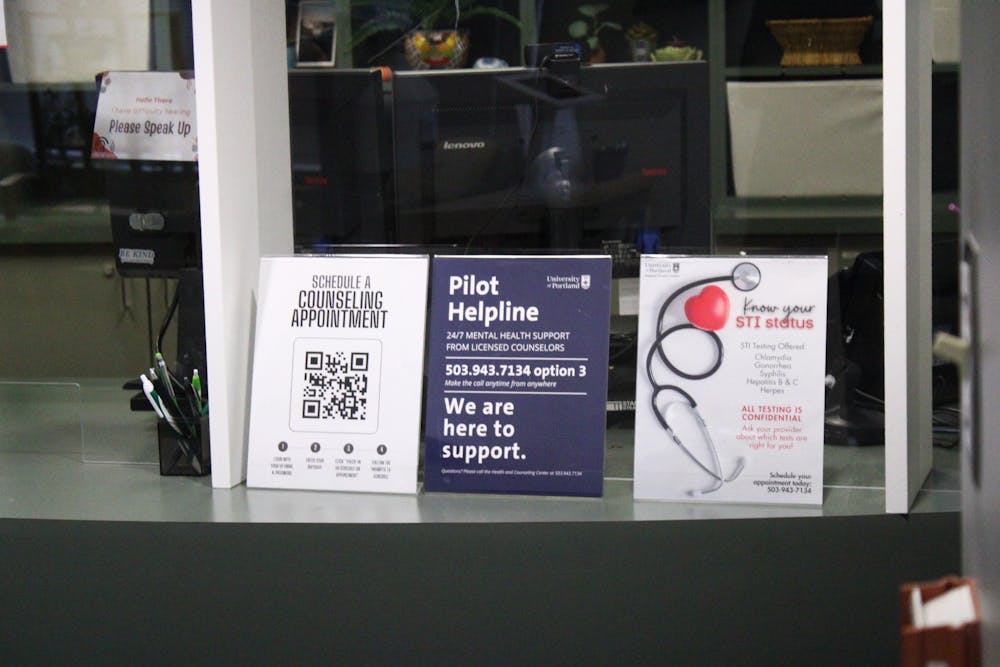Since 2015, nonprofit organization Mental Health America has ranked the 50 United States and District of Columbia in their annual State Of Mental Health In America report, made to measure mental health care and access across the US.
In the most recent report from 2022, Oregon was ranked 49.
The Health and Counseling Center (HCC) at the University of Portland is aware of this and is making changes within the department to better assist student mental health in a state that is in such dire straits.
“It's difficult for students to find a provider that they can continue to see for an ongoing basis,” Director for Student Wellness Greg Peterson said.
So, with such a situation, the HCC has developed a number of additions to the HCC to better support students at UP.
BetterMynd
The University is partnering with BetterMynd, an online company that specializes in connecting college students to teletherapy sessions with licensed clinicians. Students are able to register for BetterMynd through the University’s website page.
UP students can access five one-hour sessions for free. However, the five free sessions is not a hard-set limit, with Peterson citing that the number was chosen to best reflect the average number of sessions students tend to utilize.
“It's the amount we kind of determined based off the fact that most students, when they utilize our counseling services, tend to end services at around four or five sessions,” Peterson said. “If students are needing more, they can access more, and that's not a difficult process.”
Additionally, BetterMynd offers group therapy sessions and skills group sessions for all students, and there is no limit to the amount of group sessions students can sign up for.
“All students can access those and are able to sign up for them on their own and kind of utilize them to whatever degree that they want,” Peterson said. “There's really no limitation to the amount of groups that students could access through the platform.”
With student mental health being a growing concern within higher education, Peterson sees Bettermynd as a great way for students to find support that is convenient and free of charge.
Confidential Advocates
In the similar vein of providing students with confidential spaces to work through their mental health, UP has introduced confidential advocates to the counseling center. Confidential advocates are trained in trauma-informed care to assist survivors of sexual assault and gendered or sexual violence, without having to report to Title IX.
Interpersonal Violence Prevention Coordinator Erin Currie oversees the program, which currently consists of six University employees who are trained to be confidential advocates.
“Our primary job is to take care of survivors, get them what they need, and that's beautiful,” Currie said. “I love that. I love that about what I get to do.”
What makes confidential advocates unique is that no formal report to the Title IX office is needed for a student to seek support.
“Nobody has to tell us their story,” Currie said. “Nobody has to tell us the nitty-gritty of what happened. It can just be like, ‘I've had this experience that fits under these criteria and I need some support.’”
In addition to providing spaces to listen to survivors, confidential advocates have the resources to support survivors who may be struggling academically due to their circumstances.
“This position allows me to be that person to go out and advocate,” Currie said. “I can go and talk to the associate dean and say ‘this person needs to be, you know, can't go to class right now, can you talk to their professor and see what kinds of flexibility you know, can they attend online? Can they just get the assignments for the next two weeks? Can they have a redo on that midterm?’”
A list of the confidential advocates as well as a link to schedule an appointment with one can be found on the university’s Interpersonal Violence Prevention website.
On-campus private practice providers
The HCC is working on bringing private practice providers to campus as an additional mental health resource. Currently, there is one part-time counselor who is available for students, with hopes to add more practitioners as the semester goes on.
Sierra Renham is a clinical social worker and therapist who works as a part-time mental health provider on campus. She works at the counseling center on Tuesdays, Wednesdays and Fridays.
Additionally, the HCC is looking to bring other off-campus providers onto the Bluff in the near future.
“We've identified a private practice provider who will be on campus actually in the Health and Counseling Center,” Peterson said. “They won't be an employee of ours, but they'll be able to take all most common insurances and be able to see students when they're here on campus.”
Mental health struggles on college campuses are not uncommon, and it’s this growing distress, both at UP and outside of it, that prompted the addition of the new resources.
“The National College Health Association has identified that mental health is an increasing concern,” Peterson said. “In our own National College Health Assessment survey that we did, it's a big concern.”
With the addition of Bettermynd, confidential advocates and on-campus private practitioners, the HCC is working to combat the growing concern around college-student mental health.
Kate Cuadrado is the Editor-in-Chief of The Beacon. She can be reached at cuadrado24@up.edu.








